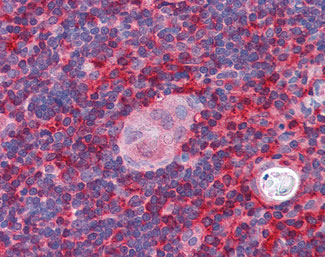ARPC1B / p41-ARC / ARP2 Antibody (N-Terminus)
Goat Polyclonal Antibody
- SPECIFICATION
- CITATIONS
- PROTOCOLS
- BACKGROUND

Application
| WB, IHC-P, E |
|---|---|
| Primary Accession | O15143 |
| Reactivity | Human, Mouse, Rat, Rabbit, Hamster, Monkey, Pig, Horse, Bovine, Dog |
| Host | Goat |
| Clonality | Polyclonal |
| Calculated MW | 41kDa |
| Dilution | ELISA (1:32000), IHC-P (2.5 µg/ml), WB (2-4 µg/ml) |
| Gene ID | 10095 |
|---|---|
| Other Names | Actin-related protein 2/3 complex subunit 1B, Arp2/3 complex 41 kDa subunit, p41-ARC, ARPC1B, ARC41 |
| Target/Specificity | Human ARPC1B / p41-ARC. |
| Reconstitution & Storage | Store at -20°C. Minimize freezing and thawing. |
| Precautions | ARPC1B / p41-ARC / ARP2 Antibody (N-Terminus) is for research use only and not for use in diagnostic or therapeutic procedures. |
| Name | ARPC1B (HGNC:704) |
|---|---|
| Synonyms | ARC41 |
| Function | Component of the Arp2/3 complex, a multiprotein complex that mediates actin polymerization upon stimulation by nucleation-promoting factor (NPF) (PubMed:11741539, PubMed:9230079). The Arp2/3 complex mediates the formation of branched actin networks in the cytoplasm, providing the force for cell motility (PubMed:11741539, PubMed:9230079). In addition to its role in the cytoplasmic cytoskeleton, the Arp2/3 complex also promotes actin polymerization in the nucleus, thereby regulating gene transcription and repair of damaged DNA (PubMed:29925947). The Arp2/3 complex promotes homologous recombination (HR) repair in response to DNA damage by promoting nuclear actin polymerization, leading to drive motility of double- strand breaks (DSBs) (PubMed:29925947). |
| Cellular Location | Cytoplasm, cytoskeleton. Nucleus |

Thousands of laboratories across the world have published research that depended on the performance of antibodies from Abcepta to advance their research. Check out links to articles that cite our products in major peer-reviewed journals, organized by research category.
info@abcepta.com, and receive a free "I Love Antibodies" mug.
Provided below are standard protocols that you may find useful for product applications.
Background
Functions as component of the Arp2/3 complex which is involved in regulation of actin polymerization and together with an activating nucleation-promoting factor (NPF) mediates the formation of branched actin networks.
References
Welch M.D.,et al.J. Cell Biol. 138:375-384(1997).
Hillier L.W.,et al.Nature 424:157-164(2003).
Gevaert K.,et al.Nat. Biotechnol. 21:566-569(2003).
Gournier H.,et al.Mol. Cell 8:1041-1052(2001).
Olsen J.V.,et al.Cell 127:635-648(2006).
If you have used an Abcepta product and would like to share how it has performed, please click on the "Submit Review" button and provide the requested information. Our staff will examine and post your review and contact you if needed.
If you have any additional inquiries please email technical services at tech@abcepta.com.













 Foundational characteristics of cancer include proliferation, angiogenesis, migration, evasion of apoptosis, and cellular immortality. Find key markers for these cellular processes and antibodies to detect them.
Foundational characteristics of cancer include proliferation, angiogenesis, migration, evasion of apoptosis, and cellular immortality. Find key markers for these cellular processes and antibodies to detect them. The SUMOplot™ Analysis Program predicts and scores sumoylation sites in your protein. SUMOylation is a post-translational modification involved in various cellular processes, such as nuclear-cytosolic transport, transcriptional regulation, apoptosis, protein stability, response to stress, and progression through the cell cycle.
The SUMOplot™ Analysis Program predicts and scores sumoylation sites in your protein. SUMOylation is a post-translational modification involved in various cellular processes, such as nuclear-cytosolic transport, transcriptional regulation, apoptosis, protein stability, response to stress, and progression through the cell cycle. The Autophagy Receptor Motif Plotter predicts and scores autophagy receptor binding sites in your protein. Identifying proteins connected to this pathway is critical to understanding the role of autophagy in physiological as well as pathological processes such as development, differentiation, neurodegenerative diseases, stress, infection, and cancer.
The Autophagy Receptor Motif Plotter predicts and scores autophagy receptor binding sites in your protein. Identifying proteins connected to this pathway is critical to understanding the role of autophagy in physiological as well as pathological processes such as development, differentiation, neurodegenerative diseases, stress, infection, and cancer.



